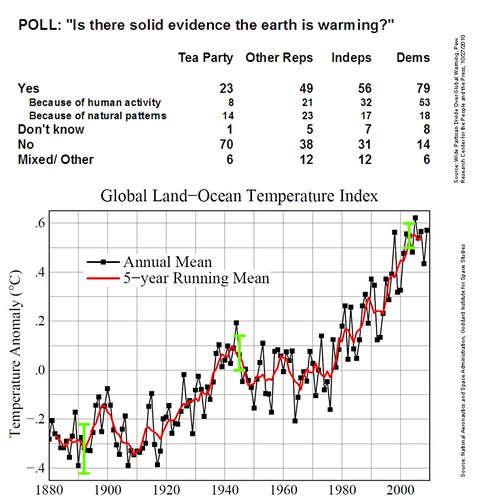In a 2009 hearing, Shimkus cited God's promise to Noah:
“Never again will I curse the ground because of man, even though all inclinations of his heart are evil from childhood and never again will I destroy all living creatures as I have done.
“As long as the earth endures, seed time and harvest, cold and heat, summer and winter, day and night, will never cease.”
(Interestingly, Jerry Falwell's 2007 sermon on climate change quoted the same passage. ) Here's Shimkus' analysis, from the Star article:
“I believe that’s the infallible word of God, and that’s the way it’s going to be for his creation,” Shimkus said. "The Earth will end only when God declares it's time to be over. Man will not destroy this Earth. This Earth will not be destroyed by a Flood," Shimkus asserted. "I do believe that God's word is infallible, unchanging, perfect."
I for one, do believe that the bible is infallible, unchanging, perfect. My problem is that he sets up the bible to be disproved by events in history. Shinkus took the trouble to cite this scriptural passages to say that the bible refutes global warming alarmism. That is a very fair assessment of his purpose in citing Scripture.
Okay, what is global warming alarmism? It is that due to anthropogenic gas pollution, the earth will experience radical, geographic shifts in its zones of agricultural productivity, and experience massive local flooding (just the low lying areas of the planet, not "the earth" as in the flood of Noah). Can anyone point to me a major green organization, a citation from the ICCP, or Science or Nature that says more? I'd like to see it!
Now the question is whether the earth has already suffered cases of massive local flooding, or radical shifts in zones in agricultural productivity due to weather changes? The suffering of the Bangladeshi people due to flooding is all too well known. It's already happening. Global warming alarmism is that more parts of the earth will experience flooding, not that the entire planet will be underwater. Greenpeace just released a statement saying,
"In an extreme runaway scenario, a complete melting of the Greenland ice sheet would add 7 metres to the world’s oceans, and a complete melting of the Antarctic sheet would add 60 metres. Those scenarios would require a massive restructuring of human civilisation as we know it. However, even a one-to-two metre rise in sea level will inundate certain port cities, islands, atolls, flood deltas and coastal plains, obliterate vulnerable species and displace millions of people.
Now let's look at seedtime and harvest. Has the weather either starved people or caused massive local suffering? How about the Irish potato famine (blamed on increased rainfall & cool weather that led to blight), and the American Dustbowl (blamed on a drought) being but two examples. And as one of my conservative friends pointed out, even during the Irish famine, the country was a net exporter of food. So we had massive suffering due to loss of agricultural productivity, but no "end to seedtime and harvest".
I would also note that the promise in Genesis 8 speaks to what God Himself would not do, not what people can do to themselves.
As I see it, there are five possibilities:
- The Bible (or at least Genesis 8) is fallible and has been completely disproven by multiple events in history, OR
- God breaks his promises, OR
- Our recollection of human history is wrong, because the bible is true. Those Irish immigrants to the United States were lying to us about conditions back home. OR
- There is a significant portion of the green movement that is saying the earth will lose all its agricultural productivity and be completely flooded, like to the top of Mount Ararat (and I just haven't been listening), OR
- Shinkus is engaged in three sins: One is a misrepresentation of what green activists and climate scientists have actually said. The second is setting up the reliability of the Word of God to be mocked by people who read the newspaper. The third is tacking "and the bible is infallible" to the end of his political opinions.

